
The creation of the sixth installment of the Heroes of Might & Magic series sent the small turn-based RPG gamer niche through various emotional highs and lows. The two biggest sources of concern was the renaming of the brand to Might & Magic Heroes (which made many think back to the failed 3DO series), plus the “dumbing down” of the unit tiers from the almost double digit tiers to just three. It seemed that the things that made it great would be forsaken in pursuit of the lucrative mainstream market.
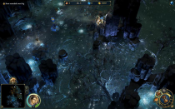
Thankfully Black Hole kept a constant dialogue with the fan community, assuring them that the new Heroes would be a worthy successor, and thus avoided various sharp sticks and torches at their door. The patient gamer’s faith has been rewarded with an extremely faithful successor to the series that embodies the turn-based RPG style.
The story of Heroes follows the same timeline as previous games but in deference to those new to the series, a very well done tutorial has been added to teach you not only the main characters you will be interacting with, but also the basics of the world and combat engines. The graphics, while not a necessity for this game type, are actually very good and provide a nice view of each faction's lands and provides its own character.
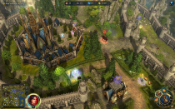
Each mission has you controlling at least one hero of a faction. For each turn you are given a set number of movement points for your hero that you can use to guide them in exploring the world to uncover various resources, treasures, towns to capture and monsters to fight. When your turn is over your opponent gets to make their own.
Whenever a battle is entered, the map zooms down to a grid layout where each army can be ordered to move, attack, defend, or use various special abilities. While your hero never actually participates in the battle, at each turn they can use one ability which can be anything from a magical attack to a spell that gives all your units have a mystical armor or allows them to regenerate. Items you collect can raise the abilities of your forces in battle or give you extra spells to use. This adds a unique dynamic to the game in that even a statistically overmatched force can still pull out a win.
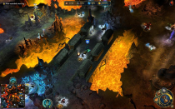
Amazingly enough the simplification of the units and rules in the game has actually made it more enjoyable to play. Managing massive armies has become a breeze and there is a clear paper-rock-scissors type pattern you can see when determining which units to attack and which to stay away from. While this type of matchup typically becomes predictable there are enough combination tricks that it is something that will take a while to master and you may never have the perfect combination to a battle and will have to rely on a lucky hit or well-timed spell.
The game has three difficulty settings but even the lowest will present a veteran some challenges with the main bosses on each map. At higher difficulties you can get wiped out by even the lowest of fights as you find your army losing more and more units in a war of attrition.

The RPG element of the series is usually tied in with your hero on each map acquiring various items and leveling up each battle, gaining new spells and abilities. Black Hole stepped this up a bit by adding the dynasties feature which records all your actions and allows you to forge a set of buffs or abilities that all characters you control will have access to. This is a surprisingly balanced feature, mainly because it can be used against others in multiplayer, with no real ability to make an uber-player later on in the series.
Perhaps due to its ambitious design or just poor development planning, Heroes VI was just full of bugs. I reached a point on the third mission where I actually was prevented from continuing because I did the two objectives required to trigger the main boss out of order (i.e., #2 then #1 instead of #1 then #2). How does that even make it past play testing? Eventually a patch was released to let me continue playing but I should have never needed to rely on the patch at all. I've touched on this in various other reviews but we are reaching a point where people are going to be waiting a month before buying just to get the bugs out.
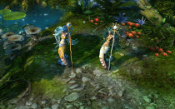
Another major thorn in my side was the ridiculous Ubisoft portal, Uplay, that you had to go through to get into the game. Despite the claim that I would only need to activate the game once online to validate my copy it rejected me numerous times while offline. One time after one of the various crashes, it wouldn’t even let me back in with an internet connection. While I can respect the idea of online verification and the desire not to have your work stolen, you are causing more harm than good when people can’t even play the game. Why would I ever want to buy something else through Uplay now that I know what it could possibly cost me in aggravation?
By the time you read this, the bugs should have been ironed out and the game is a great example of the genre and worth picking up. Just be prepared to always have an internet connection… and plenty of snacks.
Review Policy
In our reviews, we'll try not to bore you with minutiae of a game. Instead,
we'll outline what makes the game good or bad, and focus on telling you whether
or not it is worth your time as opposed to what button makes you jump.
We use a five-star rating system with intervals of .5. Below is an outline of
what each score generally means:

All games that receive this score are
standout games in their genre. All players should seek a way to play this game.
While the score doesn't equate to perfection, it's the best any game could conceivably do.

These are above-average games that most players should consider purchasing. Nearly
everyone will enjoy the game and given the proper audience, some may even love these
games.

This is our middle-of-the-road ranking. Titles that receive three stars may not make
a strong impression on the reviewer in either direction. These games may have some
faults and some strong points but they average out to be a modest title that is at
least worthy of rental for most.

Games that are awarded two stars are below average titles. Good ideas may be present,
but execution is poor and many issues hinder the experience.

Though functional, a game that receives this score has major issues. There are little
to no redeeming qualities and should be avoided by nearly all players.

A game that gets this score is fundamentally broken and should be avoided by everyone.














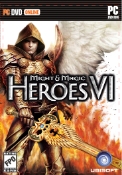

Comments